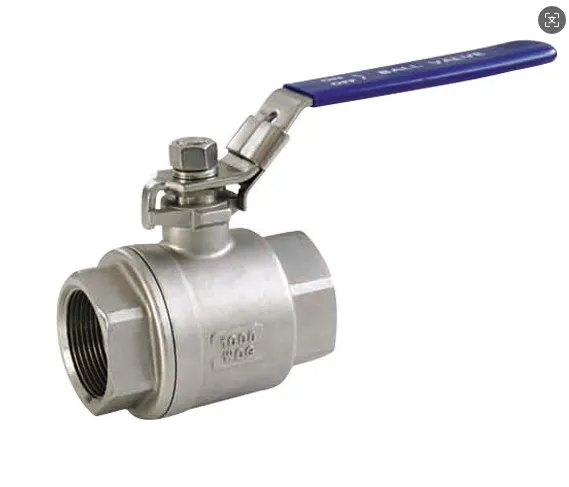May . 12, 2025 11:32
When it comes to industrial piping systems, stainless steel valves are a top choice due to their durability, corrosion resistance, and excellent performance under high pressure and extreme temperatures. Whether you need stainless steel valves for sale or are looking for specific stainless steel ball valve dimensions, understanding their features and specifications will help you make the right choice. This guide covers everything you need to know about selecting the best stainless steel valves for your application.

Industries ranging from oil and gas to food processing rely on stainless steel valves for their superior strength and resistance to harsh environments. But what makes them the best choice over other materials?
One of the biggest advantages of stainless steel valves is their ability to resist rust and corrosion, even in highly aggressive environments. Unlike brass or cast iron, stainless steel does not degrade easily, making it ideal for applications that involve chemicals, saltwater, or high humidity.
Stainless steel valves for sale are designed to handle high pressures and extreme temperatures. Whether used in steam, gas, or liquid applications, stainless steel ensures longevity and minimal maintenance.
From petrochemical plants to water treatment facilities, stainless steel valves are used in a wide range of industries. Their versatility makes them suitable for handling different types of fluids, including oils, gases, and corrosive chemicals.
Because stainless steel valves are resistant to rust and wear, they require less frequent maintenance. This reduces downtime and increases operational efficiency, making them a cost-effective solution for businesses.
Many stainless steel valves for sale comply with industry certifications like ANSI, API, and ISO. This guarantees reliability and ensures they meet safety and quality requirements.
Understanding stainless steel ball valve dimensions is crucial for selecting the right valve for your system. The dimensions determine flow capacity, pressure tolerance, and compatibility with existing pipelines.
Valve Size: The size of a stainless steel ball valve is measured by the diameter of the pipe it connects to. Common sizes range from ½ inch to 12 inches.
Port Size: Full-port ball valves offer maximum flow, while reduced-port options regulate flow rate efficiently.
Thread Type: Threaded, flanged, and welded connections are available depending on installation needs.
Pressure Rating: High-pressure stainless steel valves can handle up to 6,000 PSI, making them suitable for demanding applications.
304 Stainless Steel: Provides general corrosion resistance and is suitable for most applications.
316 Stainless Steel: Offers superior corrosion resistance, especially against chlorides and acidic environments.
321 and 347 Stainless Steel: Enhanced for high-temperature applications.
Two-Piece and Three-Piece Ball Valves: Allow for easy maintenance and disassembly.
Flanged Ball Valves: Ideal for high-pressure applications requiring secure connections.
Sanitary Ball Valves: Used in food and pharmaceutical industries to prevent contamination.
The stainless steel ball valve dimensions should align with the flow rate requirements of your system. The flow coefficient (Cv) helps determine the valve’s capacity to pass fluid at a given pressure drop. Larger valves have higher Cv values, making them ideal for high-flow applications.
If you’re looking for stainless steel valves for sale, several factors influence where and how you purchase them. Understanding these factors helps you secure high-quality valves at competitive prices.
Purchasing directly from a manufacturer guarantees the best quality control and pricing. Many manufacturers offer bulk discounts and custom orders for specific stainless steel ball valve dimensions.
Websites like Alibaba, Amazon, and ThomasNet offer a wide range of stainless steel valves for sale. These platforms provide customer reviews, price comparisons, and supplier certifications, making it easier to evaluate your options.
Buying from a local supplier ensures faster delivery and personalized customer service. Many distributors also provide installation support and maintenance services.
Before purchasing stainless steel valves for sale, verify that the product meets relevant industry standards like:
API 6D for pipeline valves
ASME B16.34 for pressure ratings
ISO 9001 for quality management
For unique applications, some suppliers offer customized stainless steel valves with specific coatings, dimensions, or pressure ratings. While slightly more expensive, custom orders ensure optimal performance for specialized industries.
Proper maintenance of stainless steel valves ensures longevity and efficiency in operation. Here are key maintenance tips:
Even though stainless steel valves resist corrosion, exposure to harsh chemicals can still cause wear. Regular inspections prevent failures and leaks.
Using the correct lubricants and cleaning solutions prevents debris buildup and ensures smooth valve operation. Always use non-corrosive cleaners to maintain valve integrity.
Seals and gaskets play a crucial role in preventing leaks. Replacing worn-out seals extends the lifespan of stainless steel valves and prevents costly repairs.
Excessive tightening of valve components can cause damage to seals and internal parts. Follow manufacturer guidelines for proper torque specifications.
Implementing a maintenance schedule helps identify potential issues before they lead to system failures. Periodic servicing ensures optimal valve performance.
Stainless steel valves offer superior corrosion resistance, high strength, and durability compared to brass or cast iron valves. They can withstand extreme temperatures and pressures, making them ideal for demanding industrial applications.
To select the right stainless steel ball valve dimensions, consider the pipe diameter, pressure rating, and required flow capacity. Consulting with a supplier or manufacturer ensures compatibility with your system.
You can find stainless steel valves for sale through online industrial marketplaces, direct manufacturers, and local distributors. Checking certifications and customer reviews helps ensure product quality.
Routine maintenance depends on usage conditions. In high-pressure or corrosive environments, stainless steel valves should be inspected every few months. Regular cleaning and seal replacements extend their lifespan.
304 stainless steel is suitable for general applications, while 316 stainless steel offers higher corrosion resistance, especially in marine or chemical environments. Choosing the right material depends on the operating conditions of your system.
Related Products
 Call us on:
+86-311-86935302
+86-311-86935302
Call us on:
+86-311-86935302
+86-311-86935302
 Email Us:
info@thriveonvalve.com
Email Us:
info@thriveonvalve.com South of Huanmadian Village Town, Ningjin County, Xingtai, Hebei Province, China
South of Huanmadian Village Town, Ningjin County, Xingtai, Hebei Province, China